欧盟外交政策
英国在欧洲的外交政策(3篇)
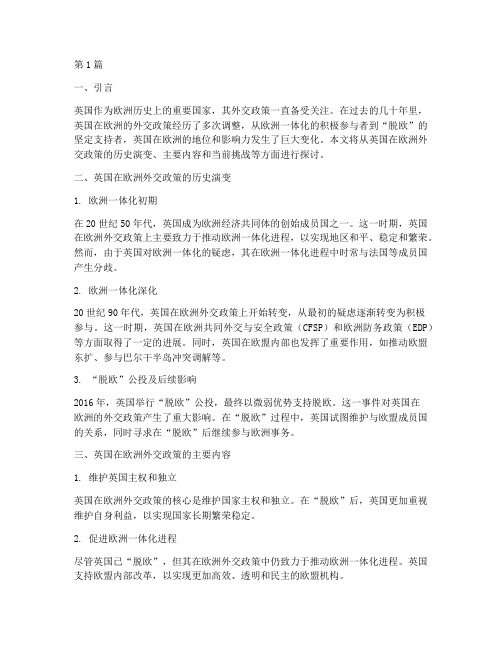
第1篇一、引言英国作为欧洲历史上的重要国家,其外交政策一直备受关注。
在过去的几十年里,英国在欧洲的外交政策经历了多次调整,从欧洲一体化的积极参与者到“脱欧”的坚定支持者,英国在欧洲的地位和影响力发生了巨大变化。
本文将从英国在欧洲外交政策的历史演变、主要内容和当前挑战等方面进行探讨。
二、英国在欧洲外交政策的历史演变1. 欧洲一体化初期在20世纪50年代,英国成为欧洲经济共同体的创始成员国之一。
这一时期,英国在欧洲外交政策上主要致力于推动欧洲一体化进程,以实现地区和平、稳定和繁荣。
然而,由于英国对欧洲一体化的疑虑,其在欧洲一体化进程中时常与法国等成员国产生分歧。
2. 欧洲一体化深化20世纪90年代,英国在欧洲外交政策上开始转变,从最初的疑虑逐渐转变为积极参与。
这一时期,英国在欧洲共同外交与安全政策(CFSP)和欧洲防务政策(EDP)等方面取得了一定的进展。
同时,英国在欧盟内部也发挥了重要作用,如推动欧盟东扩、参与巴尔干半岛冲突调解等。
3. “脱欧”公投及后续影响2016年,英国举行“脱欧”公投,最终以微弱优势支持脱欧。
这一事件对英国在欧洲的外交政策产生了重大影响。
在“脱欧”过程中,英国试图维护与欧盟成员国的关系,同时寻求在“脱欧”后继续参与欧洲事务。
三、英国在欧洲外交政策的主要内容1. 维护英国主权和独立英国在欧洲外交政策的核心是维护国家主权和独立。
在“脱欧”后,英国更加重视维护自身利益,以实现国家长期繁荣稳定。
2. 促进欧洲一体化进程尽管英国已“脱欧”,但其在欧洲外交政策中仍致力于推动欧洲一体化进程。
英国支持欧盟内部改革,以实现更加高效、透明和民主的欧盟机构。
3. 加强与欧洲邻国的合作英国在欧洲外交政策中强调与欧洲邻国的合作,以维护地区和平与稳定。
这包括加强经济、安全、文化等领域的合作。
4. 推动全球治理体系改革英国在欧洲外交政策中积极参与全球治理体系改革,以维护国际秩序和公平正义。
这包括推动联合国改革、参与国际反恐合作等。
欧盟对华人权外交的历史演进与中欧关系

欧盟对华人权外交的历史演进与中欧关系1. 欧盟对华人权外交的历史演进欧盟与中国的关系源远流长,而在人权外交领域,双方的互动也随着时间的推移而逐渐深化和复杂化。
本节将简要梳理自欧盟成立以来,其在对华人权外交方面的历史演进。
在早期的阶段,欧盟主要通过参与国际人权领域的多边合作来推动其人权理念的传播和实践。
欧盟倾向于将人权问题与国际贸易、政治议题等挂钩,通过施加压力和合作的双重手段来影响中国的人权状况。
随着中国的崛起和国际地位的提升,欧盟开始更加重视对华人权外交的战略调整。
欧盟通过加强内部协调和整合,形成了较为统一的对华人权政策框架;另一方面,欧盟也更加注重通过对话和交流的方式,与中国就人权问题展开建设性的讨论。
中欧在人权问题上的合作取得了显著成果,双方通过高层交往、人文交流等多种形式,增进了相互理解和信任。
欧盟也在不断反思和调整其人权外交策略,以更好地适应中国的发展和中国在人权问题上的立场和诉求。
欧盟对华人权外交的历史演进是一个动态的过程,受到国际形势、中欧关系发展等多种因素的影响。
随着全球政治经济格局的不断变化和人权问题的日益突出,中欧在人权外交领域的合作仍具有广阔的空间和潜力。
1.1 早期阶段自中华人民共和国成立以来,中国与欧洲国家的关系经历了多次波折。
在20世纪50年代至70年代初,由于冷战的影响,中欧关系处于低谷。
随着1971年中国恢复在联合国的合法席位以及1972年美国总统尼克松访华,中欧关系开始逐渐回暖。
在这一时期,欧洲国家开始关注中国的发展,与中国建立了外交往来。
1975年,中国与欧洲经济共同体(EEC)签署了《中欧贸易与合作协议》,标志着双方在经济领域的合作迈出了重要一步。
中欧关系在经济、政治、文化等多个领域取得了显著进展。
在这一阶段,由于意识形态的差异以及历史遗留问题的影响,中欧关系的发展仍然受到一定程度的制约。
进入20世纪80年代,随着改革开放的推进,中国与欧洲国家在各个领域的交流与合作不断加深。
欧盟共同外交与安全政策

背景介绍:在经济领域,特别是在对外贸易上,欧盟已经扮演着日益重要的角色。
然而,在传统上最能体现国家主权属性的外交和安全政策等敏感的领域,欧盟作为整体在世界上的影响力却小得多。
因此,欧盟素有“经济巨人、政治侏儒”之称。
近年来,随着《马斯特里赫特条约》和《阿姆斯特丹约条约》的签署及生效,欧盟已经建立了共同外交与安全政策,试图改变上述被动局面,从而寻求在国际事务上拥有更大的发言权,这也是为了实现政治联合的目的。
自从1648年威斯特伐里亚体系形成以来,民族国家成为国际社会的主体。
国家主权原则构成国际法的基石,而外交与安全政策成为一国主权的核心内容,因此,各国都十分重视外交与安全政策的独立性和排他性。
所以,共同外交与安全政策的演变,一直陷入了理想主义和现实主义的矛盾。
从理想主义的角度看,一开始欧洲的政治家都比较热衷于欧洲一体化进程。
尽管道路崎岖,而且路途遥远,但仍满怀信心致力于欧洲大同社会的建设。
然而,随着欧洲一体化程度的加深,国家主权便不得不让渡于某一超国家机构,当然,外交与安全政策也是让渡的内容之一。
实际上,各国基于现实原因考虑,极不情愿让渡外交与安全政策给某一超国家机构。
因此,从某种程度上说,欧盟的共同外交与安全政策内正是上述矛盾妥协的结果。
推动因素:1、首先,避免战争爆发是欧盟共同外交与安全政策得以形成的深远的历史动因。
经过两次世界大战的浩劫,欧溯人终于意识到,只有通过让渡部分国家主权联合起来才能真正避免战争。
2、其次,欧洲一体化发展是推动欧盟共同外交与安全政策形成的内在动因。
共同外交与安全政策是欧潮一体化发展的必然要求和结果,也是一体化发展的目标和理想之一。
多年的经济一体化成就使欧盟成为一个“经济巨人”,但它在国际政治舞台上的地位和作用与其经济实力极不相称:不仅不具备外交防务上的整体实力与声音,而且在国际事务上难以摆脱美国控制的阴影,因此常被讥为“政治侏儒”。
经济一体化取得进展的同时,政治一体化却明显滞后了,导致欧洲一体化过程明显失衡从而阻碍了欧盟整体实力的上升。
欧洲一体化进程的政治分析—兼论欧盟共同外交及安全政策

3、能源市场改革近年来,欧盟大力推进能源市场改革,旨在实现能源市场的 自由化和一体化。通过取消能源壁垒、加强市场监管等措施,欧盟努力打造统 一的能源市场,提高能源供应安全和市场竞争性。
三、欧盟能源一体化前景展望
欧盟能源一体化对能源安全和市场秩序具有积极的影响。首先,一体化将提升 欧盟整体的能源安全水平,通过资源整合和协同应对,降低能源进口依赖度。 其次,能源一体化有助于构建公平、透明、有序的能源市场环境,为各类市场 参与者提供公平竞争的机会。此外,一体化还将促进新能源技术的发展和环保 目标的实现,推动欧洲能源行业的可持续发展。
1、欧盟共同外交及安全政策的 背景和目的
欧盟共同外交及安全政策是欧洲一体化进程的重要组成部分,旨在加强欧盟在 对外政策和安全领域的合作。该政策的背景是冷战结束后国际形势的变化以及 欧盟在国际事务中地位的提高。其目的包括提高欧盟的国际影响力、维护成员 国的安全和利益以及在国际事务中发挥更加积极的作用。
欧洲一体化进程的政治分析—兼论欧盟 共同外交及安全政策
01 引言
目录
02 政治分析
03 共同外交及安全政策
04 结论
05 参考内容
欧洲一体化进程的政治分析—— 兼论欧盟共同外交及安全政策
引言
欧洲一体化进程是当代国际政治中最为重要的趋势之一。自1951年欧洲煤钢共 同体成立至今,欧洲一体化已经走过了漫长的道路,成为了一个涵盖27个成员 国的政治、经济和军事联盟。本次演示将从政治角度深入剖析欧洲一体化进程 的历史、现状以及面临的挑战,并在此基础上探讨欧盟共同外交及安全政策的 发展、特点及其面临的挑战。
五、结语
欧盟能源一体化对于提高能源安全和市场秩序具有重要的意义。通过不断加强 各国之间的合作,积极应对全球能源市场的挑战,欧盟有望实现能源领域的可 持续发展。在未来的发展中,欧盟需继续成员国之间的利益平衡和市场透明度 等问题,并采取有效措施加以解决。欧盟应积极拓展与其他国家和地区的能源 合作,共同推动全球能源市场的稳定和发展。
论欧盟的环境外交政策
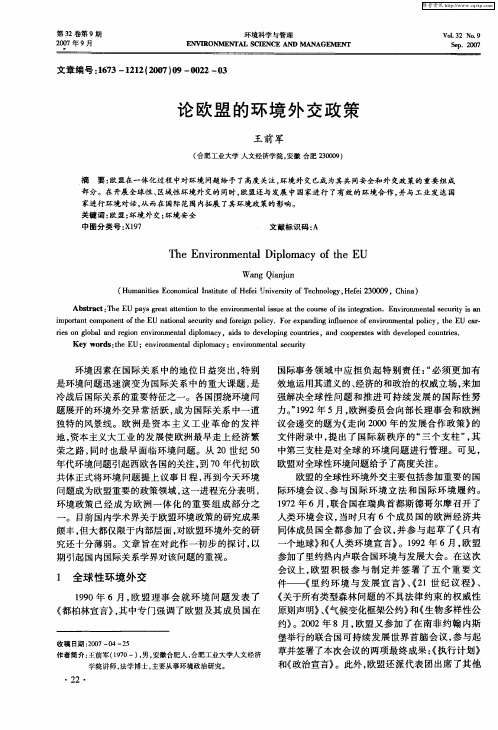
( u aie cnmi l ntu f ee U vr t o eh ooy H fi 3 0 9, hn ) H m nt sE oo c s tt o fi n esy f c nlg , ee 2 0 0 C ia i aI i e H i i T
论 欧盟 的环 境 外 交政 策
王 前 军
( 合肥工业大学 人 文经济学 院, 安徽 合肥 2 00 ) 30 9
摘
要: 欧盟在一体化过程 中对环境问题给 予了高度 关注 , 环境外交 已成为其共同安 全和 外交政策 的重要 组成
部分。在 开展 全球性 、 区域性环境外交的同时, 欧盟还 与发展 中 国家进行 了有效的环境 合作 , 并与 工业发 达 国
家进行环境对话 , 从而在 国际范围 内拓展 了其环境政策的影响。 关键词 : 欧盟 ; 环境 外交; 环境安 全
中 图分 类 号 : 17 X9 文献 标 识 码 : A
Th v r n n a p o c ft e EU e En io me tl Di l ma y o h
Ab t a t Th s r c : eEU a s g e t t n i n t h n i mn n a s ea ec u e o s i tg a in p y r a t t t e e vr ae o o o e tl s u t h o r f t e r t .En io me tl e u t sa i t s i n o v r n n a c r y i n s i i o tn o o n n ft e EU n t n ls c r y a d f r i n p l y o x a d n fu n e o n i n n a l y,t e EU c r mp ra tc mp e t a o a e u t n o e g i 、F re p n i g il e c fe vr me tlp i o h i i o c n o o c h a- re n go a n e in e v r n e t l i l ma y,a d o d v l p n o n re ,a d c o e a e t e e o e o n r s i s o lb la d r g o n i m n a p o c o d i s t e e o i g c u tis n o p r ts wi d v l p d c u ti . h e Ke r s t e EU;e v r n e t l i lma y;e v r n e tls c r y y wo d :h n i m n a po c o d n i m n a e u t o i
欧洲外交欧盟的外交政策与全球影响力

欧洲外交欧盟的外交政策与全球影响力欧洲外交:欧盟的外交政策与全球影响力提要:欧洲外交对于欧盟来说是至关重要的,因为它是欧盟成员国之间协调行动,促进和平与繁荣发展的手段。
本文将讨论欧盟的外交政策以及其对全球的影响力。
引言:欧盟作为一个政治和经济联盟,一直致力于维护欧洲地区的和平与稳定,并通过外交政策来实现这一目标。
随着全球化的加速和国际形势的复杂化,欧盟的外交政策也日益重要。
本文将探讨欧盟的外交政策及其在全球舞台上的影响力。
第一部分:欧盟的外交政策框架1.1 欧盟外交政策的目标与原则欧盟的外交政策旨在维护和平与安全、促进国际合作、支持人权与民主以及保护环境与可持续发展。
其基本原则包括多边主义、规则性和共同行动。
1.2 欧盟外交政策的主要工具欧盟通过多种工具来实施其外交政策,包括外交对话、经济交流、发展援助、共同安全与国防政策等。
这些工具帮助欧盟在国际事务中发挥更大的作用。
第二部分:欧盟的全球影响力2.1 欧盟作为全球贸易重要角色欧盟是世界上最大的贸易集团之一,其对全球贸易的影响力巨大。
欧盟通过与其他国家和地区签订贸易协定,促进和扩大国际贸易,对全球经济发展起着重要作用。
2.2 欧盟在气候变化与环保领域的领导地位欧盟一直是全球气候变化与环保领域的重要参与者。
欧盟通过制定严格的环保法规和减排目标,致力于推动全球气候变化问题的解决,并在国际气候谈判中发挥重要作用。
2.3 欧盟在国际安全与冲突解决中的角色欧盟通过共同安全与国防政策,积极参与国际安全事务与冲突解决。
欧盟派遣和平稳定力量和警察部队到世界各地,维护和平与安全,推动冲突解决与国家建设。
第三部分:欧盟外交政策面临的挑战3.1 多边主义与全球化逆流随着全球主义的衰退与保护主义的兴起,欧盟的多边主义价值观受到威胁。
欧盟需要应对这一挑战,维护多边主义并推动全球化进程。
3.2 内部一致性与欧盟历史冲突欧盟由多个成员国组成,成员国之间存在历史遗留问题和地缘政治纠纷,这可能影响欧盟的一致性和团结。
欧盟共同外交与安全政策的政策工具及政策产出分析
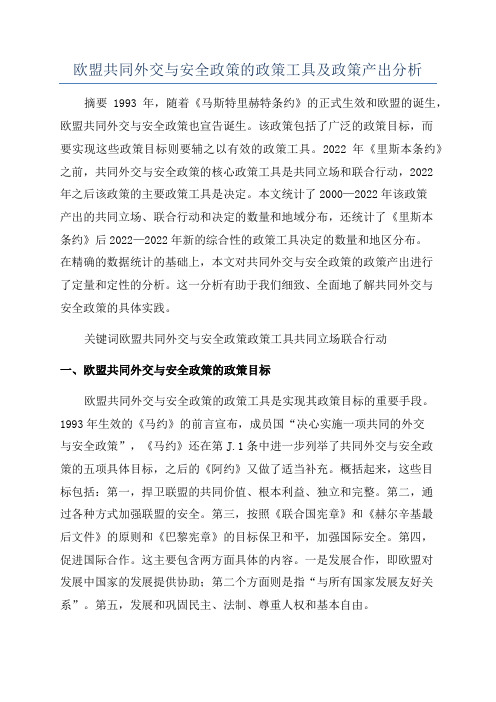
欧盟共同外交与安全政策的政策工具及政策产出分析摘要1993年,随着《马斯特里赫特条约》的正式生效和欧盟的诞生,欧盟共同外交与安全政策也宣告诞生。
该政策包括了广泛的政策目标,而要实现这些政策目标则要辅之以有效的政策工具。
2022年《里斯本条约》之前,共同外交与安全政策的核心政策工具是共同立场和联合行动,2022年之后该政策的主要政策工具是决定。
本文统计了2000—2022年该政策产出的共同立场、联合行动和决定的数量和地域分布,还统计了《里斯本条约》后2022—2022年新的综合性的政策工具决定的数量和地区分布。
在精确的数据统计的基础上,本文对共同外交与安全政策的政策产出进行了定量和定性的分析。
这一分析有助于我们细致、全面地了解共同外交与安全政策的具体实践。
关键词欧盟共同外交与安全政策政策工具共同立场联合行动一、欧盟共同外交与安全政策的政策目标欧盟共同外交与安全政策的政策工具是实现其政策目标的重要手段。
1993年生效的《马约》的前言宣布,成员国“决心实施一项共同的外交与安全政策”,《马约》还在第J.1条中进一步列举了共同外交与安全政策的五项具体目标,之后的《阿约》又做了适当补充。
概括起来,这些目标包括:第一,捍卫联盟的共同价值、根本利益、独立和完整。
第二,通过各种方式加强联盟的安全。
第三,按照《联合国宪章》和《赫尔辛基最后文件》的原则和《巴黎宪章》的目标保卫和平,加强国际安全。
第四,促进国际合作。
这主要包含两方面具体的内容。
一是发展合作,即欧盟对发展中国家的发展提供协助;第二个方面则是指“与所有国家发展友好关系”。
第五,发展和巩固民主、法制、尊重人权和基本自由。
可以看出来,《马约》对欧盟共同外交与安全政策范围的界定有以下几个特点:其一是非常全面和宽泛,目标一和目标二主要是欧盟在国际上所要维护的自身利益,目标三、目标四和目标五是欧盟共同外交与安全政策要促进的国际利益。
具体而言,这些目标不仅涉及外交、安全与防务领域,还囊括了保障人权、基本自由和巩固民主等。
从“结构性外交”视角看欧盟的北极政策
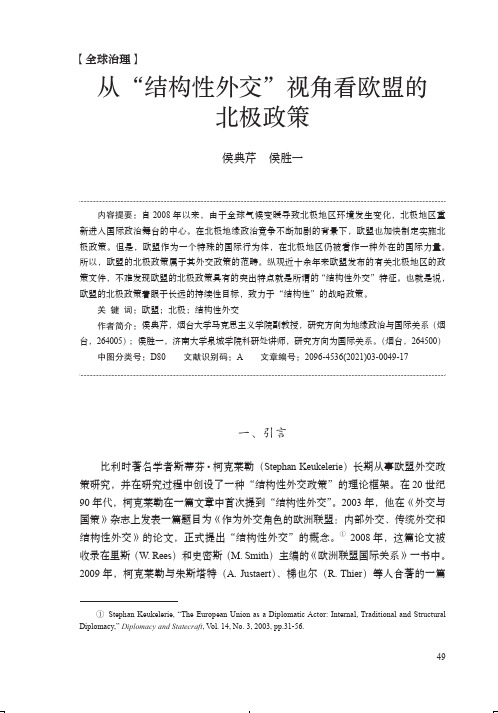
【全球治理】从“结构性外交”视角看欧盟的北极政策侯典芹侯胜一内容提要: 自2008年以来,由于全球气候变暖导致北极地区环境发生变化,北极地区重新进入国际政治舞台的中心。
在北极地缘政治竞争不断加剧的背景下,欧盟也加快制定实施北极政策。
但是,欧盟作为一个特殊的国际行为体,在北极地区仍被看作一种外在的国际力量。
所以,欧盟的北极政策属于其外交政策的范畴。
纵观近十余年来欧盟发布的有关北极地区的政策文件,不难发现欧盟的北极政策具有的突出特点就是所谓的“结构性外交”特征。
也就是说,欧盟的北极政策着眼于长远的持续性目标,致力于“结构性”的战略政策。
关 键 词: 欧盟;北极;结构性外交作者简介: 侯典芹,烟台大学马克思主义学院副教授,研究方向为地缘政治与国际关系(烟台,264005);侯胜一,济南大学泉城学院科研处讲师,研究方向为国际关系。
(烟台,264500)中图分类号: D80 文献识别码:A 文章编号:2096-4536(2021)03-0049-17一、引言比利时著名学者斯蒂芬·柯克莱勒(Stephan Keukelerie)长期从事欧盟外交政策研究,并在研究过程中创设了一种“结构性外交政策”的理论框架。
在20世纪90年代,柯克莱勒在一篇文章中首次提到“结构性外交”。
2003年,他在《外交与国策》杂志上发表一篇题目为《作为外交角色的欧洲联盟:内部外交、传统外交和结构性外交》的论文,正式提出“结构性外交”的概念。
a2008年,这篇论文被收录在里斯(W. Rees)和史密斯(M. Smith)主编的《欧洲联盟国际关系》一书中。
2009年,柯克莱勒与朱斯塔特(A. Justaert)、梯也尔(R. Thier)等人合著的一篇a Stephan Keukelerie, “The European Union as a Diplomatic Actor: Internal, Traditional and Structural Diplomacy,” Diplomacy and Statecraft, V ol. 14, No. 3, 2003, pp.31-56.—区域与全球发展 2021年第3期论文发表在《海牙外交杂志》上,论文题目为《重新评估外交:结构性外交与欧盟的个案》。
国际政治:解读世界大国的外交政策
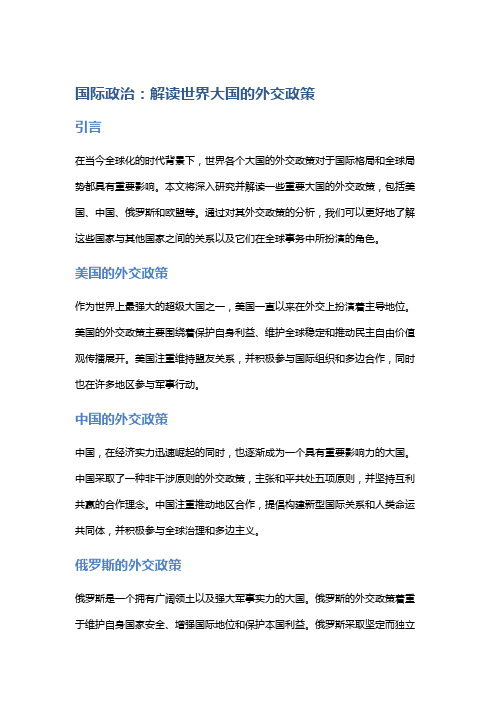
国际政治:解读世界大国的外交政策引言在当今全球化的时代背景下,世界各个大国的外交政策对于国际格局和全球局势都具有重要影响。
本文将深入研究并解读一些重要大国的外交政策,包括美国、中国、俄罗斯和欧盟等。
通过对其外交政策的分析,我们可以更好地了解这些国家与其他国家之间的关系以及它们在全球事务中所扮演的角色。
美国的外交政策作为世界上最强大的超级大国之一,美国一直以来在外交上扮演着主导地位。
美国的外交政策主要围绕着保护自身利益、维护全球稳定和推动民主自由价值观传播展开。
美国注重维持盟友关系,并积极参与国际组织和多边合作,同时也在许多地区参与军事行动。
中国的外交政策中国,在经济实力迅速崛起的同时,也逐渐成为一个具有重要影响力的大国。
中国采取了一种非干涉原则的外交政策,主张和平共处五项原则,并坚持互利共赢的合作理念。
中国注重推动地区合作,提倡构建新型国际关系和人类命运共同体,并积极参与全球治理和多边主义。
俄罗斯的外交政策俄罗斯是一个拥有广阔领土以及强大军事实力的大国。
俄罗斯的外交政策着重于维护自身国家安全、增强国际地位和保护本国利益。
俄罗斯采取坚定而独立的外交立场,注重发展友好关系并扩大对外影响力。
此外,俄罗斯还特别注重与其近邻国家以及其他大国之间的战略合作。
欧洲联盟的外交政策欧洲联盟是一个由28个成员国组成的经济和政治联盟。
欧盟在外交政策上强调共同行动和一致性,并致力于推动欧洲一体化进程。
欧盟通过发展共同安全和防务政策、开展经贸合作以及参与全球问题解决等方面来实现其外交目标。
尽管欧盟成员国之间存在一些分歧,但它们仍然努力寻求共同立场并发挥影响力。
结论通过对这些大国外交政策的解读,我们可以看到每个国家在推动自身利益、维护国际秩序以及促进全球稳定方面都有各自独特的战略和做法。
同时,这些大国之间也会因为利益冲突而产生紧张关系,并在某些全球性问题上形成竞争态势。
了解和理解这些外交政策将有助于我们更好地把握世界格局、预测未来发展趋势,并为国际合作和平稳发展作出贡献。
欧洲简史欧洲的外交政策与国际关系

欧洲简史欧洲的外交政策与国际关系欧洲简史:欧洲的外交政策与国际关系作为世界上最为发达和复杂的地区之一,欧洲的外交政策与国际关系一直备受关注。
本文将从历史的角度出发,探讨欧洲在不同时期的外交政策以及国际关系对欧洲的影响。
一、中世纪欧洲的外交政策与国际关系中世纪欧洲的外交政策以城邦体系为基础。
各个城邦通过婚姻联姻、领土交换等方式来达成政治利益的最大化。
同时,由于基督教的影响,宗教因素也在一定程度上影响了欧洲各国的外交政策。
然而,中世纪欧洲的外交政策并不稳定,持续的领土争端和内外战争导致了欧洲的动荡局势。
在这个时期,外交政策并没有形成一个统一的框架,每个国家都更注重自身的利益,缺乏整体的合作和共同的外交政策目标。
二、近代欧洲的外交政策与国际关系近代欧洲的外交政策与国际关系的演变可以追溯到16世纪。
伴随着新的航海技术和科学革命的兴起,欧洲列强开始积极探索、殖民和扩张。
这时期的外交政策主要以殖民扩张和贸易为中心,各国通过签订条约和建立势力范围来保护和扩大自己的利益。
到了18世纪,随着欧洲列强的实力逐渐均衡,外交政策逐渐进入了一个相对稳定的时期。
通过缔结同盟、平衡势力等方式,各国之间的战争有了较长期间的停止。
同时,启蒙运动的思潮也逐渐影响了欧洲各国的外交政策,理性和平等的原则成为外交政策的重要组成部分。
三、两次世界大战后的欧洲外交政策与国际关系两次世界大战对欧洲的外交政策和国际关系产生了巨大的冲击。
在第二次世界大战后,为了防止类似的战争再次发生,欧洲国家开始寻求和平和合作的路径。
1951年,法国、德国、意大利、比利时、卢森堡和荷兰签署了《罗马条约》,建立了欧洲经济共同体(EEC),后来发展成为欧洲联盟(EU)。
欧盟的建立标志着欧洲国家在外交政策上的协调和合作。
欧盟成员国共同制定政策,共同推进欧洲一体化的进程。
同时,欧盟也成为了欧洲国家集体行使外交政策的重要机构,通过外交和经济手段发挥影响力,维护欧洲的利益。
欧盟的外交政策与全球角色
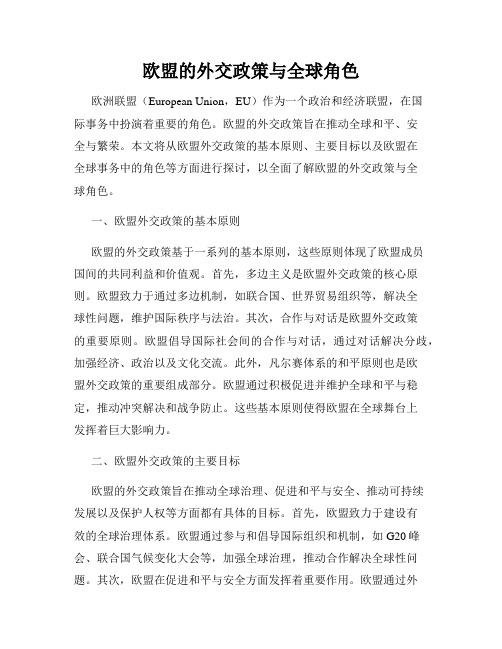
欧盟的外交政策与全球角色欧洲联盟(European Union,EU)作为一个政治和经济联盟,在国际事务中扮演着重要的角色。
欧盟的外交政策旨在推动全球和平、安全与繁荣。
本文将从欧盟外交政策的基本原则、主要目标以及欧盟在全球事务中的角色等方面进行探讨,以全面了解欧盟的外交政策与全球角色。
一、欧盟外交政策的基本原则欧盟的外交政策基于一系列的基本原则,这些原则体现了欧盟成员国间的共同利益和价值观。
首先,多边主义是欧盟外交政策的核心原则。
欧盟致力于通过多边机制,如联合国、世界贸易组织等,解决全球性问题,维护国际秩序与法治。
其次,合作与对话是欧盟外交政策的重要原则。
欧盟倡导国际社会间的合作与对话,通过对话解决分歧,加强经济、政治以及文化交流。
此外,凡尔赛体系的和平原则也是欧盟外交政策的重要组成部分。
欧盟通过积极促进并维护全球和平与稳定,推动冲突解决和战争防止。
这些基本原则使得欧盟在全球舞台上发挥着巨大影响力。
二、欧盟外交政策的主要目标欧盟的外交政策旨在推动全球治理、促进和平与安全、推动可持续发展以及保护人权等方面都有具体的目标。
首先,欧盟致力于建设有效的全球治理体系。
欧盟通过参与和倡导国际组织和机制,如G20峰会、联合国气候变化大会等,加强全球治理,推动合作解决全球性问题。
其次,欧盟在促进和平与安全方面发挥着重要作用。
欧盟通过外交渠道、军事行动以及人道援助等方式参与解决地区冲突,为全球和平与安全作出贡献。
此外,欧盟也积极推动可持续发展目标的实现。
欧盟在气候变化、可再生能源开发等方面发挥着领导作用,致力于推动全球可持续发展。
另外,保护人权是欧盟外交政策的一项重要目标。
欧盟通过外交手段、经济援助等方式推动人权的普遍尊重和保护。
三、欧盟在全球事务中的角色欧盟在全球事务中扮演着积极的角色,具有全球影响力。
首先,欧盟是全球贸易的重要角色之一。
欧盟拥有庞大的经济实力和内部市场,通过与其他国家和地区签署贸易协定,促进了全球贸易自由化和经济发展。
欧盟的外交与安全政策的发展与挑战

欧盟的外交与安全政策的发展与挑战随着全球化的不断推进和国际形势的日益复杂化,欧盟的外交与安全政策愈发显得重要。
欧盟一直积极推动其外交与安全政策的发展,争取在国际事务中发挥更大的作用。
然而,欧盟在这一领域面临着一系列的挑战。
本文将探讨欧盟外交与安全政策的发展,并分析当前主要面临的挑战。
一、欧盟外交与安全政策的发展1. 历史背景欧盟外交与安全政策的发展可以追溯到上世纪50年代欧洲经济共同体的创立。
当时的欧洲共同体主要关注经济合作,但随着时间的推移,随着欧盟成员国对外关系的日益紧密以及国际形势的变化,外交与安全政策逐渐成为欧盟发展的重要方向。
2. 法律基础《里斯本条约》是欧盟外交与安全政策的法律基础。
该条约于2009年生效,为欧盟提供了更多外交与安全政策的议定权力,并设立了欧洲外交行动署等机构以支持外交与安全政策的实施。
3. 目标与原则欧盟外交与安全政策的目标包括:促进国际和平与安全、推动全球发展与繁荣、保护欧盟公民的利益和价值观。
在外交与安全政策实施中,欧盟坚持多边主义、信任建设和规则为基础的国际秩序。
4. 工具与合作欧盟外交与安全政策的实施主要通过外交行动、危机管理和军事行动等工具实现。
欧盟还与其它国际组织和国家开展战略伙伴关系,如与联合国、北约等合作,以共同推动全球和平与安全。
二、欧盟外交与安全政策面临的挑战1. 内部政治分歧欧盟成员国之间在外交与安全政策方面存在一定的分歧。
由于成员国的利益和政策取向不同,协调外交政策变得复杂。
此外,一些成员国也对外交与安全政策的深化产生疑虑,担忧可能削弱国家主权。
2. 外部威胁与挑战欧盟面临着来自各种外部威胁与挑战,如恐怖主义、地区冲突、非法移民和网络安全等。
这些问题需要欧盟与其它国家和国际组织进行广泛合作才能有效应对。
3. 全球治理体系变革全球治理体系正在发生变革,国际格局不断调整。
在这一过程中,欧盟需要适应新的国际形势,同时也要推动国际秩序的公平和公正,以维护自身的利益和价值观。
欧盟的共同外交与安全政策成就与挑战

欧盟的共同外交与安全政策成就与挑战欧盟的共同外交与安全政策:成就与挑战简介欧盟的共同外交与安全政策(Common Foreign and Security Policy, CFSP)旨在为成员国提供一个共同的外交和安全框架,以维护欧洲的和平与稳定。
本文将探讨欧盟 CFSP 的成就与挑战,并讨论其对欧洲及全球的影响。
I. 成就1.1 加强欧洲的外交协调欧盟 CFSP 通过协调成员国的外交政策,提供了一个共同的声音和立场。
这使得欧盟能够更加有效地对外交事件做出回应,例如在乌克兰危机和伊朗核协议等重大事件中,欧盟能够以整体的力量参与谈判和斡旋,加强了其在国际事务中的影响力。
1.2 增强欧洲的安全合作CFSP 的一个重要目标是加强欧洲的安全合作,保护成员国的共同利益。
欧盟通过成立欧洲安全与防务政策(European Security and Defence Policy, ESDP),发展了共同的安全和防务能力。
这包括共同的军事行动,例如索马里海盗问题中的“统一行动”(Atalanta Mission),以及欧洲联盟对非洲国家的维和行动,如中非共和国和马里等。
1.3 加强与非洲和其他地区的伙伴关系欧盟通过 CFSP 加强了与非洲和其他地区的伙伴关系,以促进可持续发展和增加地区间的合作。
通过共同外交努力,欧盟与非洲国家建立了战略伙伴关系,并通过发展援助和促进经济合作,推动了地区的稳定与发展。
II. 挑战2.1 成员国利益的差异欧盟成员国在外交政策和安全问题上存在着不同的利益和优先事项。
这使得共同外交与安全政策的协调变得复杂,因为成员国往往更倾向于追求自身国家利益,而不是为整个欧盟的利益而奋斗。
这种差异限制了欧盟在一些重大国际事务中的一致立场。
2.2 防务能力薄弱尽管欧盟通过 ESDP 加强了成员国的军事合作,但欧盟的防务能力仍然相对薄弱。
欧盟成员国的军事预算和装备水平存在差异,限制了欧盟在军事行动中的效能和战略影响力。
2024年全球大国外交情况分析

2024年全球大国外交情况分析1. 引言2024年全球外交形势呈现出复杂多变的特点,各大国纷纷调整其外交战略,以应对不断变化的国际格局。
本文将重点分析我国、美国、俄罗斯、欧盟等主要国家的外交政策及其对全球政治经济格局的影响。
2. 我国外交情况分析2024年,我国继续秉持和平发展道路,积极参与全球治理体系改革和完善。
在外交政策上,我国坚定维护国家主权和领土完整,坚决维护国家核心利益。
与此同时,我国致力于深化同世界各国的友好合作,推动构建人类命运共同体。
在经济外交方面,我国继续推进“一带一路”倡议,加强与沿线国家的经贸往来和互联互通。
在区域合作层面,我国积极参与亚太经合组织、上海合作组织等多边机制,推动区域一体化进程。
在人文交流方面,我国积极开展文化交流与合作,推动世界文明互学互鉴,提升国际影响力。
3. 美国外交情况分析2024年,美国在外交政策上继续强调维护其全球领导地位。
美国加强与盟友的关系,共同应对全球性挑战。
在亚太地区,美国推动“印太战略”,以应对我国日益增长的国际影响力。
在经济外交方面,美国积极推动与盟友的贸易往来,维护其全球经济霸主地位。
在安全领域,美国继续维护其军事霸权,强化对关键技术的控制。
在人文交流方面,美国积极推动文化交流,提升其软实力。
4. 俄罗斯外交情况分析2024年,俄罗斯在外交政策上致力于维护国家主权和领土完整,加强与我国、印度等国的战略协作,平衡国际格局。
在经济外交方面,俄罗斯积极寻求与亚太地区国家的合作,推动共建欧亚经济联盟。
在安全领域,俄罗斯坚定维护其核武库,加强军事力量建设。
在人文交流方面,俄罗斯积极开展文化交流,提升国际影响力。
5. 欧盟外交情况分析2024年,欧盟在外交政策上强调团结自强,推动欧洲一体化进程。
欧盟加强与我国、美国、俄罗斯等大国的合作,共同应对全球性挑战。
在经济外交方面,欧盟推动内部市场一体化,加强与外的经贸往来。
在安全领域,欧盟加强防御能力建设,维护地区安全稳定。
欧盟的外交政策合作与独立的平衡
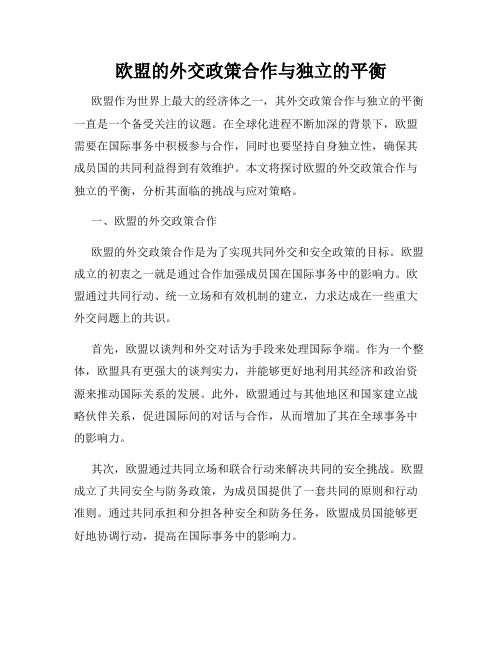
欧盟的外交政策合作与独立的平衡欧盟作为世界上最大的经济体之一,其外交政策合作与独立的平衡一直是一个备受关注的议题。
在全球化进程不断加深的背景下,欧盟需要在国际事务中积极参与合作,同时也要坚持自身独立性,确保其成员国的共同利益得到有效维护。
本文将探讨欧盟的外交政策合作与独立的平衡,分析其面临的挑战与应对策略。
一、欧盟的外交政策合作欧盟的外交政策合作是为了实现共同外交和安全政策的目标。
欧盟成立的初衷之一就是通过合作加强成员国在国际事务中的影响力。
欧盟通过共同行动、统一立场和有效机制的建立,力求达成在一些重大外交问题上的共识。
首先,欧盟以谈判和外交对话为手段来处理国际争端。
作为一个整体,欧盟具有更强大的谈判实力,并能够更好地利用其经济和政治资源来推动国际关系的发展。
此外,欧盟通过与其他地区和国家建立战略伙伴关系,促进国际间的对话与合作,从而增加了其在全球事务中的影响力。
其次,欧盟通过共同立场和联合行动来解决共同的安全挑战。
欧盟成立了共同安全与防务政策,为成员国提供了一套共同的原则和行动准则。
通过共同承担和分担各种安全和防务任务,欧盟成员国能够更好地协调行动,提高在国际事务中的影响力。
最后,欧盟通过建立外交机构和代表团的方式来加强成员国的合作。
欧洲委员会的外交与安全政策高级代表负责协调成员国的外交事务,与其他国际组织和国家进行对话,并代表欧盟成员国参与国际会议。
这些机构的建立为欧盟提供了一个更加协调和高效的外交合作平台。
二、欧盟的外交政策独立尽管欧盟致力于加强成员国之间的外交政策合作,但独立性也是其外交政策的重要组成部分。
欧盟的外交政策独立性主要表现在以下几个方面。
首先,欧盟的外交政策是基于共同利益的原则。
欧盟成员国虽然在一些重大外交问题上会追求共同立场,但在某些国家利益冲突较大的问题上,欧盟也能够容忍不同的意见和立场。
这种灵活性使得欧盟在协商中保持了一定的独立性。
其次,欧盟强调多边主义和国际法的原则。
欧盟的外部援助与发展合作政策
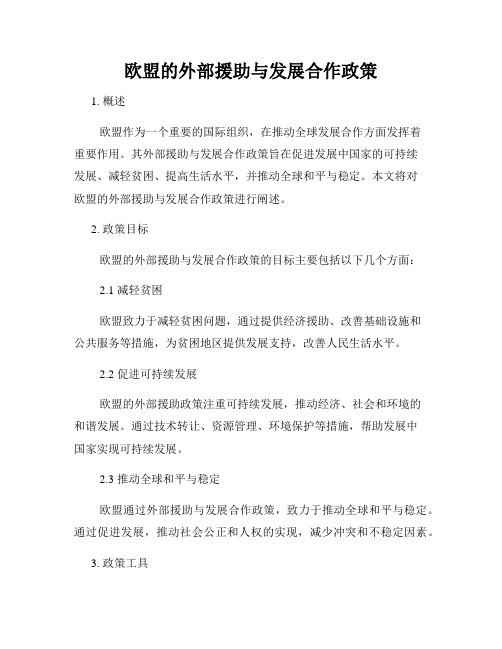
欧盟的外部援助与发展合作政策1. 概述欧盟作为一个重要的国际组织,在推动全球发展合作方面发挥着重要作用。
其外部援助与发展合作政策旨在促进发展中国家的可持续发展、减轻贫困、提高生活水平,并推动全球和平与稳定。
本文将对欧盟的外部援助与发展合作政策进行阐述。
2. 政策目标欧盟的外部援助与发展合作政策的目标主要包括以下几个方面:2.1 减轻贫困欧盟致力于减轻贫困问题,通过提供经济援助、改善基础设施和公共服务等措施,为贫困地区提供发展支持,改善人民生活水平。
2.2 促进可持续发展欧盟的外部援助政策注重可持续发展,推动经济、社会和环境的和谐发展。
通过技术转让、资源管理、环境保护等措施,帮助发展中国家实现可持续发展。
2.3 推动全球和平与稳定欧盟通过外部援助与发展合作政策,致力于推动全球和平与稳定。
通过促进发展,推动社会公正和人权的实现,减少冲突和不稳定因素。
3. 政策工具为了实现上述目标,欧盟采取了多种政策工具:3.1 经济援助欧盟向发展中国家提供经济援助,包括贷款、捐赠、投资等形式。
这些援助可以用于发展基础设施、改善教育、医疗等领域,为贫困地区提供资金支持。
3.2 技术转让欧盟通过技术转让,将自身在科技、农业、环境保护等方面的先进技术引进到发展中国家,帮助他们提高生产力和发展水平。
3.3 政策对话与合作欧盟与发展中国家进行政策对话与合作,通过制定合作协议、共同解决问题等方式,推动双方在发展领域的合作。
3.4 提供人道主义援助欧盟积极参与人道主义援助工作,为受灾地区提供救援、庇护和重建支持,缓解人道主义危机带来的影响。
4. 经验与成果欧盟的外部援助与发展合作政策在过去的几十年中取得了许多显著成果。
以下是一些具体的经验与成果:4.1 加强区域合作欧盟通过支持区域合作组织和项目,加强了发展中国家之间的合作,提高了资源利用效率,促进了经济发展。
4.2 促进性别平等欧盟的援助政策注重促进性别平等,支持女性参与决策和发展进程,增加女性的经济、社会权益。
欧洲的外交政策

欧洲的外交政策欧洲作为一个多国家组成的大陆,一直致力于维护和平、促进合作,其外交政策也一直是国际舞台上的重要议题之一。
本文将从欧洲外交政策的背景、目标和影响力等方面进行探讨。
一、背景欧洲的外交政策受到其悠久的历史与文化背景的影响。
欧洲有着许多经济、政治和安全利益相互交织的国家,这使得欧洲各国之间的关系错综复杂。
此外,历史上的战争和争端也让欧洲深刻认识到战争的破坏力和合作的重要性。
二、目标1. 维护和平稳定:欧洲的外交政策致力于通过多边合作和外交手段,维护欧洲地区的和平稳定。
例如,欧盟通过建立共同的价值观和法律体系,推动成员国之间的和解和合作。
2. 推动经济发展:欧洲的外交政策也旨在促进欧洲的经济发展和繁荣。
欧洲国家通过外交合作,加强贸易交流和投资合作,推动经济一体化和共同市场的建设。
3. 保护环境和可持续发展:欧洲国家高度重视环境保护和可持续发展议题,在外交政策中积极推动环保和可持续发展的合作。
例如,欧洲在国际气候变化谈判中发挥重要作用,推动全球应对气候变化的合作。
三、影响力欧洲的外交政策在国际事务中具有一定的影响力。
1. 国际组织参与:欧洲国家积极参与并成立了多个国际组织,如欧盟、北约等,在这些组织中发挥重要作用,与其他国家展开对话和合作。
2. 多边外交:欧洲国家倡导多边主义和国际法治,通过参与国际组织和多边机制,推动和平解决争端,维护世界和平与安全。
3. 人权与民主:欧洲国家崇尚人权和民主原则,在国际事务中积极倡导并捍卫这些价值观,使其在全球范围内得到广泛认同和尊重。
四、挑战与前景然而,欧洲的外交政策也面临一些挑战。
首先,欧洲国家之间存在着不同的利益和观点,因此在制定共同的外交政策时需要进行艰难的协商和权衡。
其次,在全球化和地缘政治变化的背景下,欧洲面临着来自于其他大国和地区的竞争和挑战。
不过,欧洲国家拥有丰富的外交经验和多边合作传统,他们可以通过加强内部合作和与其他国家的对话,应对外部挑战并推动其外交政策的发展与进步。
_里斯本条约_与欧盟共同外交与安全政策

欧盟制宪研究专题《里斯本条约》与欧盟共同外交与安全政策金 玲 内容提要:《里斯本条约》对欧盟对外关系领域进行了一系列重大改革,包括设立欧盟常任主席、合并原高级代表与欧盟对外关系专员职位、设置欧洲对外关系行动署、扩大有效多数表决机制的使用范围等,其改革的一个重要目的是提高联盟对外政策的连续性、有效性和一致性,提升欧盟的国际行为体角色。
上述改革被普遍乐观地认为会加强欧盟用一个声音说话的能力。
但是由于改革并没有改变欧盟对外关系领域内共同外交与安全政策支柱体系下独特的决策特征,加上《里斯本条约》中相关的制度革新仍然具有相当程度的模糊性,因此改革在短时间内会加剧欧盟共同外交与安全政策领域内的期待—能力差距。
关键词:《里斯本条约》对外关系共同外交与安全政策实施困境2007年12月13日,欧盟成员国首脑在葡萄牙首都里斯本签署了欧盟新条约———《里斯本条约》,取代已经宣告失败的《欧盟宪法条约》。
《里斯本条约》基本保留了宪法条约对欧盟体制所进行的各项改革,目前已进入批准阶段,计划于2009年生效。
《里斯本条约》对欧盟对外关系领域所进行的各项改革虽然没有从根本上改变共同外交与安全政策(Common Foreign and Security Policy,以下简称CFSP)的政府间性质,但仍被寄予了厚望,被认为必将加强欧盟在世界舞台上用一个声音说话的能力。
本文将重点阐述《里斯本条约》对共同外交与安全政策进行的制度改革,分析其产生的影响,探讨条约本身存在的漏洞所带来的操作性问题。
一《里斯本条约》与CFSP 的机构调整《里斯本条约》对共同外交与安全政策进行了一系列制度革新和调整,目的是使欧盟能够有效解决扩大的欧盟在CFSP 领域所面临的问题,以及能够更好地面对21世纪的外交与安全挑战。
《里斯本条约》对CFSP 所做的机构调整包括:欧洲理事会常任主席职位的设立、欧洲对外行动署(Eur opean External Acti on Service,以下简称EE AS )的设置、欧盟外交与安全政策事务高级代表职位①的设立。
欧盟的外交政策与全球影响力
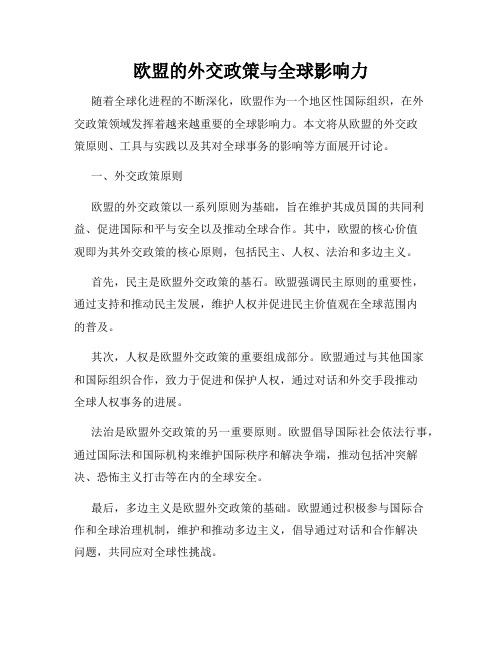
欧盟的外交政策与全球影响力随着全球化进程的不断深化,欧盟作为一个地区性国际组织,在外交政策领域发挥着越来越重要的全球影响力。
本文将从欧盟的外交政策原则、工具与实践以及其对全球事务的影响等方面展开讨论。
一、外交政策原则欧盟的外交政策以一系列原则为基础,旨在维护其成员国的共同利益、促进国际和平与安全以及推动全球合作。
其中,欧盟的核心价值观即为其外交政策的核心原则,包括民主、人权、法治和多边主义。
首先,民主是欧盟外交政策的基石。
欧盟强调民主原则的重要性,通过支持和推动民主发展,维护人权并促进民主价值观在全球范围内的普及。
其次,人权是欧盟外交政策的重要组成部分。
欧盟通过与其他国家和国际组织合作,致力于促进和保护人权,通过对话和外交手段推动全球人权事务的进展。
法治是欧盟外交政策的另一重要原则。
欧盟倡导国际社会依法行事,通过国际法和国际机构来维护国际秩序和解决争端,推动包括冲突解决、恐怖主义打击等在内的全球安全。
最后,多边主义是欧盟外交政策的基础。
欧盟通过积极参与国际合作和全球治理机制,维护和推动多边主义,倡导通过对话和合作解决问题,共同应对全球性挑战。
二、外交政策工具与实践欧盟的外交政策依靠一系列工具来实践其外交目标,包括共同立场、发展援助、贸易政策、外交对话和军事行动等。
这些工具在维护欧盟利益、推动国际合作及实现全球影响力方面起到了重要作用。
共同立场是欧盟外交政策的核心工具之一。
欧盟成员国在外交事务上协调立场,通过共同表态和行动,增强了欧盟在全球事务中的声音和影响力。
发展援助是欧盟外交政策的重要组成部分。
欧盟致力于减贫和可持续发展,通过向发展中国家提供援助,推动全球发展,并通过发展援助项目来加强与其他国家和地区的合作关系。
贸易政策是欧盟外交政策的重要手段之一。
欧盟是全球最大的单一市场,通过与其他国家和地区签署贸易协定,推动国际贸易自由化,扩大欧盟在全球贸易中的份额和影响力。
外交对话是欧盟外交政策的重要推进工具。
- 1、下载文档前请自行甄别文档内容的完整性,平台不提供额外的编辑、内容补充、找答案等附加服务。
- 2、"仅部分预览"的文档,不可在线预览部分如存在完整性等问题,可反馈申请退款(可完整预览的文档不适用该条件!)。
- 3、如文档侵犯您的权益,请联系客服反馈,我们会尽快为您处理(人工客服工作时间:9:00-18:30)。
----------------------- Page 1-----------------------Keynote Address on European Union Foreign PolicyConcluding Session, EU Enlargement:Implications for the EU and AustraliaThe Rt Hon Christopher PattenEU Commissioner for External RelationsNational Europe Centre Paper No. 92Address to the National Press Club, CanberraThursday 17 April 2003----------------------- Page 2-----------------------The war in Iraq has undeniably been a setback in our attempts to create a commonEuropean foreign policy. This is not wholly surprising since it raises such difficultissues even if the conflict itself was mercifully quick. What are the consequences forour relationship with the world’s only super-power and its relationship with us? Andrelations between the west and the Islamic world, and prospects for peace in theMiddle East? How can we deal with global threats like weapons of mass destructionwithout strengthening institutions of global governance like the UN? Member Stateshave been and continue to be all over the place on Iraq, even if there is more commonground at the level of public opinion. The usual attempts to paper over differences through insipid declarations have fooled no-one.(Sources: )The immature and vulnerable sideof European togetherness has been starkly revealed.Yet at the same time, we are witnessing a real triumph of European foreign policy –the imminent enlargement of our Union to ten new countries in Central and EasternEurope on 1 May 2004. This historic development underlines the force of our mosteffective foreign policy instrument. A policy that grew from a determination to lashFrance and Germany inseparably together. Two countries that had fought three warsin the previous 70 years, with the cost of so many lives from all our countries. Howwould Asia look today if China and Japan had followed a similar course?The UK held back at the start, fearing that the project was too ambitious. That itwould not work. This tragic miscalculation has coloured Britain’s relations in Europeever since. This is why, for example, the UK was not able to influence the originaldesign of the Common Agricultural Policy which today is the main cause of frictionin EU-Australia relations, despite the significant reforms in recent years. Yet overall,European integration has been spectacularly successful: 50 years of peace andgrowing mutual understanding. The prospect of EU membership was the force forconsolidating democracy in Greece, Spain and Portugal. We initially tried topersuade Finland, Austria and Sweden that the European Economic Area offered aviable alternative –but they wanted full membership before it really got off theground. Most countries of Western Europe are now members.In economic terms, the single market –now 10 years old - has created some 2.5million jobs and a huge boost to our collective prosperity. The emergence of the euroas a major international currency has brought exchange rate stability and been a----------------------- Page 3-----------------------stimulus to reform and better economic management in participating Member States.Behind these figures lie the massive changes that have occurred in the way we live,travel and work. Since 1992, more than 15 million EU citizens have moved toanother Member States to work or enjoy their retirement. They enjoy proper welfareprotection and have voting rights where they live.With the end of the Soviet Empire we faced a new challenge. In a remarkably shortperiod, we have helped to transform the former communist countries to enable themto join our democratic and market-based club. A striking achievement that has helpedto prevent the collapse of the former soviet system into political chaos on ourdoorstep. And we should not lose sight of the moral case for enlargement: for toolong the countries of Central and Eastern Europe have been separated bytotalitarianism from the benefits of European civilisation. We could not continue toshut the door on them. The signature of the Accession Treaties in Athens yesterdaywas the culmination of our biggest post-war foreign policy success.The tool of enlargement is still being used. If they can show that they are ready foraccession, Romania and Bulgaria will be able to join in 2007. Next year, we willreturn to the question of Turkey’s membership prospects. And the offer ofmembership is the centre-piece of our largely successful –if unfinished - effortsbringing peace and stability to the Western Balkans. In the last few days, the Councilhas asked the Commission for an assessment of Croatia’s r ecent application.What will it mean? A voyage into the unknown certainly as we only now start toassess the political and institutional challenge of dealing with a Union of 25 memberstates. But the basic vision will not change – an ever closer union of countries, unitedby our shared values of democracy and open markets. And we will remain outward-looking with a deep commitment to the multilateral institutions of global governance.Each step forward in European integration –the customs union, single market, theeuro, and successive waves of enlargement - has created fears that the EU will turn inon itself. Fears of a fortress Europe. Yet these has never materialised. Nor will theyas the result of the present enlargement.Enlargement will create new land and sea borders for the EU and that brings newneighbours. Countries with 385 million inhabitants: Russia, the Western NIS and----------------------- Page 4-----------------------the Southern Mediterranean. The new Member States will strengthen the Union’sinterest in enhancing relations with these countries. Over the coming decade andbeyond, the Union’s capacity to provide security, stability and sustainabledevelopment to its own citizens will converge with our interest in close cooperationwith our neighbours.Interdependence - political and economic –with the Union’s neighbourhood isalready a reality. The emergence of the Euro as a significant international currencyhas created new opportunities for intensified economic relations. Closer geographicalproximity means the enlarged EU and the new neighbourhood will have an equalstake in furthering efforts to promote trans-national flows of trade and investment aswell as even more important shared interests in working together to tackle trans-boundary threats – from terrorism to airborne pollution.In return for concrete progress demonstrating shared values and effectiveimplementation of political, economic and institutional reforms, the EU’sneighbourhood should benefit from the prospect of closer economic integration withthe EU. This is why, the Commission has recentl y proposed a “wider Europe” policyfor our new neighbours. That Russia, the countries of the Western NIS and theSouthern Mediterranean should be offered the prospect of a stake in the EU’s InternalMarket and further integration and liberalisation to promote the free movement of –persons, goods, services and capital (four freedoms).Enlargement will not just impact on our relations with our neighbours. In today’sglobal village, countries further afield like Australia will also see the benefits. Everyprevious enlargement has been good for economic growth in the accession countries.Enlargement will add 70 million people, a 20 % increase in the population of the EU.Yet the initial impact on the EU economy will be less than half that because of themuch smaller GDP per head in the accession countries. Just as countries like Ireland,Spain and Greece have achieved remarkable progress in convergence of income andstandards of living (towards the EU average) following their accession, forecasts forthe next ten years point to continued rapid economic growth in the accessioncountries. Unsurprisingly, European and international business has been bettingheavily on enlargement from the very outset. Thus, enlargement will not only give----------------------- Page 5-----------------------the EU a huge internal market, it will give it a growth market conducive tointerchange and innovation.This is good news for the future of Australia’s economic relations with the EU. Forthe last 11 years, the EU has been your biggest single economic partner: 16% of tradein goods, 21% of trade in services and the largest source of inward investment in theAustralian economy with an accumulated stock of some A$269bn or 33% of totalforeign investment. As we expand to take in new, dynamic and fast growingeconomies, the importance of these figures will grow and the related businessopportunities increase.The unprecedented scale of the present enlargement is forcing the EU to ask hardquestions about the affordability of some of our policies. In particular, there iswidespread recognition that there will need to be further changes in the way wesupport agriculture. We have already made substantial progress in moving away frommarket-distorting subsidies and export refunds to a system of direct aid for farmers.The Commission has proposed to Member States to we should take advantage of thepresent World Trade Organisation talks to go much further in this direction.Specifically, we have suggested progressive cuts in trade-distorting farm subsidies bymore than half over the coming years (55%) and a similar reduction in expenditure onexport refunds (45%). These measures should be combined with further opening ofagricultural markets by reducing agricultural tariffs.There will always be a political need to compensate EU farmers for the structuralchallenges that they face. But enlargement will create internal pressures that shouldhelp us to make a significant offer in the WTO. As well as meeting longstandingconcerns of Australia and like-minded partners, these measures should contribute toensuring a fairer global trading system for the poorest countries.We also need to make sure, with our institutions and policies, that the EU canfunction properly on a day-to-day basis without collapsing under its own weight.That is the purpose of the debate in the present Convention devoted to the future ofthe European project. It would be premature to try to second-guess the outcome ofthis great reform debate. However, I think there is one truly strategic question at thecentre of the Convention’s work: is the “Community method”, as it is kn ow, a suitable----------------------- Page 6-----------------------basis to build the future on or do we need to introduce more inter-governmentalcooperation? As far as I can see, there is a large majority, including therepresentatives of the accession countries, in favour of the essential idea behind theCommunity method.Finally, while we have been sharing sovereignty in the trade field for many years,effective European cooperation in foreign and security policy is relatively new. Butprompted by the tearing down of the Berlin Wall and with it the collapse of the brutalcertainties of the Cold War, by our humiliating failures in the Balkans in the 90s andby a growing recognition of the gap between our political and our economic clout inthe world, Europe has been gradually putting together a common foreign and securitypolicy.We have done better in some senses than we are given credit for – most notably in theBalkans, where our work is admittedly only half-done and more recently inAfghanistan. Ambitions to go further faster are clear. There is much discussion ofinstitutional changes that could help give European foreign policy more coherenceand visibility. All very interesting to be sure, but there is in my judgement aconsiderable element of the cart being asked to precede the horse in all this. Take forexample the idea of a specially chosen full-time President of the Council whose task,among other things, would be to represent Europe to the world, providing thetelephone number for which Dr. Kissinger has hunted for so long.Suppose that today we had such a President, another ex-Prime Minister perhaps,raised to the purple by his peers, and let us wave him on his way on his first visit toWashington. How happy would Mr. Blair, Mr. Chirac and Mr. Schroeder be whenthey saw him on television sitting down in the Oval Office to tell Mr. Bush whatEurope’s view –and by implication their own –was on Iraq? Institutions cansometimes help to develop or change political will. But no amount of institutionaltinkering can be a substitute for political will. Europe will only have a whollycredible foreign policy when the political will exists to create one.Our aspirations would gain in credibility if we were prepared to invest rather more inour own security. Now I am not talking about seeking to rival the United States,whose defence budget of nearly $400 billion represents over 40% of the world’s total----------------------- Page 7-----------------------spending on weapons and warriors. Yet we should not forget that there are timeswhen diplomacy must be backed by a credible threat of force to carry weight. Unlesswe are prepared in Europe to spend a bit more of defence, our foreign and securitypolicy will simply not have enough effective influence.Where we are already big hitters, we should seek to hit harder still. At the UNConference at Monterrey last year, we committed ourselves to benchmarked increasesin development assistance.(Sources: )We must hold to those promises, and exceed them if wecan. More important, it is imperative that we give a strong lead in the talks launchedin Doha to open further international markets and to make global trade rules and theinstitution that upholds them fairer to the poor. There is no way of avoiding thatobligation if we are serious about our commitment to make multilateral approaches and institutions work.These institutions – such as the UN, the IMF, the World Bank, the WTO – provide astructure for the civilised resolution of global disputes and a civilised approach to thenew global agenda. It is in the common interest that they should be strengthened, notleast by trying to develop the regional grouping within them so as to expeditedecision-making and implementation.To sum up therefore the work of building a united and prosperous Europe is goingahead steadily. Europe will remain open to the outside world. The transatlanticrelationship will continue to loom very large despite the present tensions. Andprecisely because of these tensions, relations with other partners sharing the samevalues and policy goals will remain very important. By being in Australia at thistroubled time, I want to underline this message and highlight the considerable futurepotential of our bilateral relations.。
